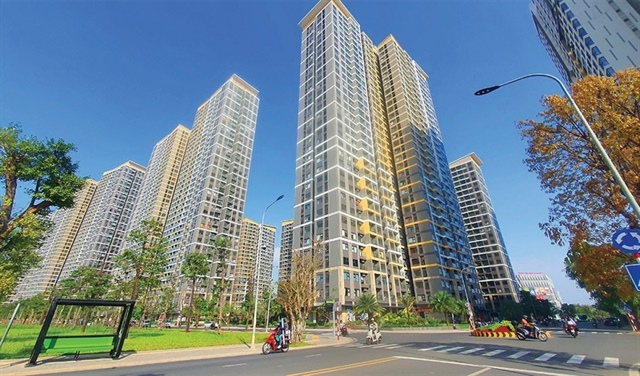Real estate market targets low-income earners to stir economy
Real estate market targets low-income earners to stir economy
Viet Nam planned to develop social housing and housing for the middle class in order to stimulate demand for real estate, said Minister of Construction Trinh Dinh Dung.

He was speaking at a discussion with the National Assembly's Economic Committee yesterday morning on ways to solve the real estate market's current downturn.
At the meeting, NA Deputy Chairwoman Nguyen Thi Kim Ngan stressed that any new policies should aim to stabilise the macroeconomy, promote production and business and ensure social security.
Solutions must be based on evaluations of the situation at hand and the relationship between supply and demand, and should include a long-term roadmap towards sustainable development, she said, adding that the biggest difficulty the market faced was high inventory.
According to Dung, the real estate market experienced a difficult period last year with high inventories and prices declining in all segments. "These difficulties would continue in the coming year," he stressed.
The ministry's statistics showed that the total value of real estate inventories in the country was estimated at VND111.963 trillion (US$5.332 billion), 27 per cent and 12.5 per cent of which were in HCM City and Ha Noi, respectively. Building material inventories were estimated at VND6.753 trillion ($321.6 million).
Real estate outstanding loans to the end of November last year totalled VND225.207 trillion ($10.73 billion) with bad debts accounting for 5.55 per cent.
"The reality might be even worse," Dung said.
He attributed the high inventories to lack of planning and uncontrolled development, resulting in a supply-demand imbalance. Supply exceeded demand in the high-class segment while demand exceeded supply in low-income housing.
Deputy Tran Du Lich urged the relevant ministry to clarify who was accountable for the imbalance. In order to balance supply and demand, projects would be adjusted to meet the solvency of buyers, Dung said.
Accordingly, housing projects that had not implemented site clearance or were not in accordance with the plan would be halted, large projects would be divided into smaller ones and commercial housing projects could be shifted to other purposes.
In response to the query from Deputy Do Van Duong about how these developments would impact the quality of urban areas, Dung said that any adjustments must be approved by State management agencies.
According to Dung, the real estate restructuring process must also be in line with the national housing development strategy, especially social housing development. He predicted there would be huge demand for social houses in the coming years given the country's 32 per cent urbanisation rate.
The ministry planned to require buyers of social houses to meet certain criteria in order to ensure that social housing was provided only to those who were really in need. Tax incentives to encourage investment in social housing projects were also needed, he said.
Dung also called for the financial system to get involved in rescuing the real estate market by resolving bad debts.
Deputy Governor of the State Bank of Viet Nam (SBV) Dang Thanh Binh said that this year SBV would offer a loan programme for social and low-income houses with more reasonable terms and interest rates. However, to promote long-term development, Binh urged the creation of a new mechanism of providing loans.
At the meeting, Dung also singled out the weak management of State agencies, the lack of legal regulations governing the real estate sector and the slow issuance of necessary documents as other factors negatively affecting the market, saying that the ministry would focus on improving the quality of these documents and enhancing management this year.
vietnamnews




























